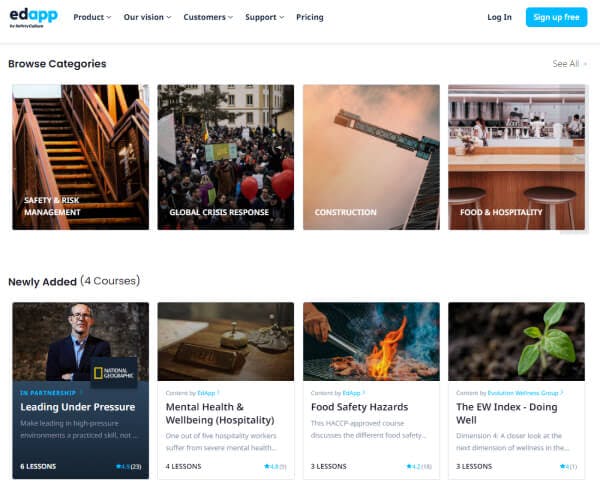How to Improve Soft Skills

It’s becoming a widely accepted fact, that the best employees count among those who combine professional knowledge on the subject matter with high-profile soft skills. Expertise is vital but without good communication, presentation skills, and leadership skills, the path to achieving business goals is bound to be rough. We take a look at why it’s crucial to invest in your team’s social skills: and why it will pay off.
What are soft skills?
Soft skills (also called personal, complementary, or transferable skills), are qualities that characterize a person’s character and social aptitude: their ability to communicate well, work with others, and willingness to improve their competencies.

They are thought to complement hard skills which are directly linked to one’s profession: soft skills are considered applicable in all fields. While a list of hard skills presented by a potential employee remains crucial, many HR departments are more and more interested in a thorough screening of one’s soft skills as they contribute to becoming successful in almost every role.
Why do we need soft skills?
Soft skills are characterized as “clusters of productive personality traits that characterize one’s relationships in a social environment.” Every workplace is fundamentally a social space where various personalities meet and collaborate toward common goals. Success rates of achieving the goals depend as much on the pool of professional knowledge and experience, as on the smooth collaboration and interpersonal skills of those involved.

Soft skills are crucial for ensuring efficient communication, problem-solving, conflict-resolution, troubleshooting, critical-thinking, and teamwork with an added intercultural factor. They are also fundamental for learning and accepting criticism that will inevitably happen in every work environment. People with highly developed soft skills and abilities are more likely to thrive in a job interview and professional environment: they are team-oriented, keen on finding solutions, navigate conflicts well, and handle difficult situations with grace.
The importance of teaching soft skills
Soft skills have not been considered vital in the employment process until very recently. At best, they were thought to complement hard skills directly related to the task. As it turns out, people with interpersonal skills such as leadership, rhetoric, and team building are more likely to succeed.
As research shows, rather than a wide range of hard skills, employers seek people with high metacognitive skills. Metacognition is understood here as a lifelong ability to learn, adapt and handle uncertainty in a fast-changing professional environment. While the previous generation of employees found it normal to remain in the same position or the same company throughout their whole career, today it’s no longer the case.

The reality of the contemporary job market demands that employees are willing to learn, adapt, and change their object of professional interest fast. In such a case, hard skills become secondary to overall experience and agility.
Hard vs. soft skills
Hard skills are gained through formal education and training or learning-by-doing. Soft skills are usually learned through being in a social environment. Research shows that gaining social skills takes place at an early age: usually between 1 and 9 years old. Heckman and Kautz (2012) proved, that early-stage personality trait training has beneficial outcomes at later stages in life.

Teaching social skills such as decision making, active learning, and problem-solving to children below 3 significantly improved their school performance and later, contributed to their financial stability, reduced criminality, and teenage pregnancy rates. (Dee and West, 201; Durlak et al., 2011). Teaching emotional awareness and self-control to small children turned out to have considerable benefits for them as adults: they scored for better job posts and enjoyed higher wages as compared to the members of the control group that didn’t go through the same soft skill training.
How to improve soft skills?
Teaching soft skills objectively presents bigger challenges than teaching hard skills. Formal education and training provide well-founded and comprehensive programs aimed at implementing new knowledge from scratch. Getting a degree in computer science, biology, or languages requires discipline, intellectual capacity, and determination but doesn’t necessarily require input from others.

Gaining soft skills happens during interaction with other people: it’s a constant give and takes. While it may be hard to gain hard skills without guidance, it’s possible. Gaining soft skills is virtually impossible without proper mentoring. While someone might have a natural proclivity towards being a great leader, his inborn abilities will get them only as far. Seeing how soft skills are becoming more and more important, an increasing number of companies start to invest in soft skills training courses.
Learning soft skills with EdApp
Learning is never easy and when it comes to unquantifiable skills such as communication, it’s hard to design and conduct formalized courses in that matter and measure their impact. Usually, the results are visible only over time and require consistent monitoring.

Be that as it may, the introduction of online learning technologies has made teaching and measuring the impact of soft skills much easier. Learning management systems (LMS) such as EdApp offer customizable solutions tailored to the needs of businesses on every scale. Its free, comprehensive course library offers hundreds of courses aimed at improving and practicing multiple skills: including soft skills, such as non-verbal and verbal communication, listening skills, personal skills, leadership, negotiation, self-awareness, empathy, emotional intelligence, and so on.
EdApp provides high-quality, ready-to-use materials which can be deployed to your team at any time. Communication skills courses such as “Effective communication” or “Communication in project management” are thematically divided into several lessons followed by a quiz. Every lesson contains a compact “nugget” of knowledge, easy to remember and use. These short training programs can help you master your non-verbal communication skills as well as your public-speaking skills.

Courses on EdApp use multiple state-of-the-art online learning methods such as microlearning and gamification, which are bound to improve knowledge retention and learner satisfaction. Short- and long-term effects of the course can be later measured through another EdApp tool, its analytics dashboard, allowing users to provide feedback to the course creators.
Whether a small family-run company or a global corporation, they both tackle similar issues and want to reach their objectives. With employees ready to learn, adapt, take lead and communicate well, the company is not only going to reach its business goals but produce flexible, close-knit teams and increase employee retention rates. Soft skills, for long, pushed to the back burner, are proving to be crucial in today’s ever-changing job market. And with the right use of tools offered by EdApp, polishing the soft skills has never been easier.
Join EdApp for free and begin strengthening your soft skills today.
Author
Guest Author Marta Rudnicka
Marta Rudnicka is a creative content writer with vast experience in writing, editing, translation, and data analysis. Aside from writing, their interests are centered on mental health, human rights, travel, and environmental concerns.
